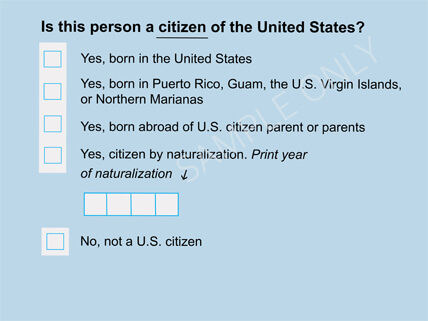Sample of proposed census citizenship question
To ask or not to ask: that is the question regarding Census 2020 and citizenship. Controversy arose over whether the census questionnaire that is mailed to all U.S. households could ask residents about their citizenship status. In a departure from recent practice, Secretary of Commerce Wilbur Ross, whose department oversees the Census Bureau, planned to add the question to the upcoming census. California’s attorney general sued the Commerce Department, objecting to inclusion of the question. When the lawsuit made it to the U.S. Supreme Court, in a 5–4 decision, the justices struck down the Trump administration’s citizenship question. The administration then dropped the issue, but it is important to understand why some considered it controversial to ask about citizenship.
First, a quick “refresher” on the census. The U.S. Constitution requires that an “enumeration”—basically a state-by-state head count of the national population—be taken once every 10 years. The purpose of the census is to provide the basis for determining the number of seats in the House of Representatives apportioned, or allotted, to each state. The Constitution says the count is to be of “the whole number of persons in each state.” Apportionment thus also determines each state’s number of votes in the Electoral College. Census data also are used in dividing up billions of dollars of to federal spending.
The Constitution requires Congress to carry out the census as it “shall by law direct.” By legislation, Congress largely turned over to the Commerce Department decisions as to how the census is conducted. Over time, the Census Bureau has expanded the scope of the census, using it to gather a vast amount of demographic data, such as on sex, age, race, and Hispanic/Latino origin. In addition to the familiar short form, the Census Bureau sends a long-form questionnaire to a targeted, smaller number of American households (for a statistical sample). The long-form census asks about citizenship status; the short form does not, though it did from 1890 to 1950.
Those who object to the proposed citizenship question argue that including it will cause some people, especially noncitizen immigrants, not to turn in their census forms. The critics’ assumption is that someone who is not a citizen may fear disclosing that fact. The result would be an undercount of the actual population. In the event of an undercount, states like California with a large immigrant population could lose representation when redistricting occurs in 2021. Secretary Ross claimed that proper enforcement of the Voting Rights Act required the government to have more complete data on the country’s voting-age population.
Image credit: © Wild 2 Free/Shutterstock
Related Links:
- Supreme Court Leaves Census Question on Citizenship in Doubt
This article details the Supreme Court’s decision nixing the census citizenship question.
(Source: New York Times, June 27, 2019) - Why the Census Citizenship Question Matters
A discussion of the pros and cons of the census citizenship question.
(Source: Real Clear Politics, April 23, 2019) - What to Know about the Citizenship Question the Census Bureau Is Planning to Ask in 2020
This FactTank report summarizes the controversy surrounding the census citizenship question.
(Source: Pew Research Center, March 30, 2019) - Civics (History and Government) Questions for the Naturalization Test
To become a citizen, if you’re not born one, you need to pass this test! Check it out.
(Source: U.S. Citizenship and Immigration Services; accessed August 6, 2019) - See 200 Years of Twists and Turns of Census Citizenship Questions
Historical background on how and when the Census Bureau has queried U.S. residents about citizenship.
(Source: NPR, April 23, 2019) - Is the Government Required to Count the Number of Citizens in Each State?
This article explores the citizenship question controversy in the context of the Fourteenth Amendment.
(Source: Reason.com, April 25, 2019)




